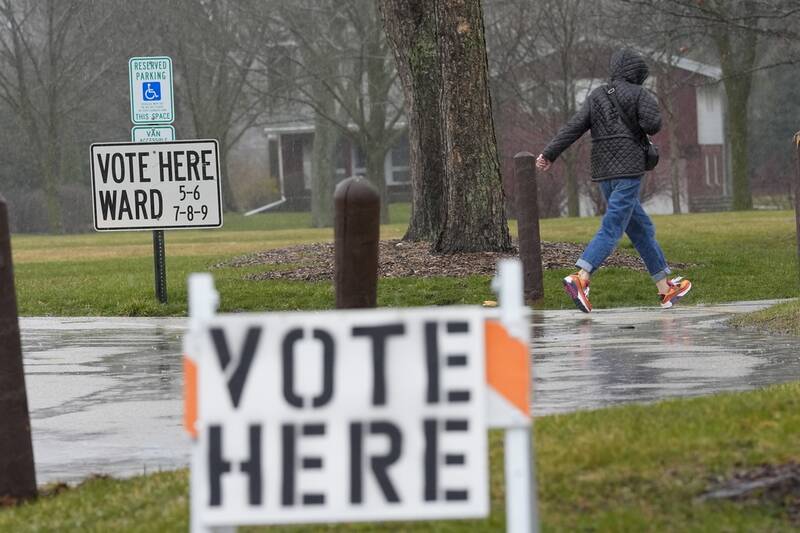Sep 10, 2024 12:54 PM - 820 words
By SCOTT BAUER Associated Press
MADISON, Wis. (AP) — The Wisconsin Supreme Court wrestled Tuesday with whether a Republican had standing to bring a lawsuit that challenges the use of a mobile voting van in 2022 and seeks to ban their use in any future election in the presidential battleground state.
Such vans — a single van, actually — were used just once, in Racine in a primary election in 2022. It allowed voters to cast absentee ballots in the two weeks leading up to the election. Racine, the Democratic National Committee and others say nothing in state law prohibits the use of voting vans.
Whatever the court decides will not affect the November election, as a ruling isn't expected until later and no towns or cities asked to use alternative voting locations for this election before the deadline to do so passed. But the ruling will determine whether mobile voting sites can be used in future elections.
Much of the oral argument Tuesday focused on whether the Racine County voter who brought the lawsuit was “aggrieved” under state law and allowed to sue. If the court rules that he didn't have standing, it could make it more difficult to bring future lawsuits challenging election laws.
Liberal Justice Jill Karofsky said she had a hard time seeing how the voter who brought the lawsuit, Racine County Republican Party Chairman Ken Brown, had been injured by simply witnessing use of the mobile voting van.
The law allows Brown, as a voter, to file a complaint because he believed an election official was breaking the law, said Lucas Vebber, attorney for the conservative Wisconsin Institute for Law and Liberty which represented Brown. Vebber argued that any voter can bring an election lawsuit in their local jurisdiction.
But Gabe Johnson-Karp, representing the Wisconsin Elections Commission, argued that the voter in this case wasn't personally injured and therefore can't bring a lawsuit. He can't bring a lawsuit making a “generalized grievance about too many people voting or the election officials not following the law,” Johnson-Karp argued.
Liberal Justice Ann Walsh Bradley asked if the court would have to consider other issues in the case if it determines Brown did not have standing.
Vebber said he didn't know if the court could, but if it did, “I think it would be beneficial to the voters of Wisconsin and to the government entities to resolve these issues.”
Republicans argue it is against state law to operate mobile voting sites, that their repeated use would increase the chances of voter fraud, and that the one in Racine was used to bolster Democratic turnout.
Wisconsin law prohibits locating any early voting site in a place that gives an advantage to any political party. There are other limitations on early voting sites, including a requirement that they be “as near as practicable” to the clerk’s office.
For the 2022 election, Racine city Clerk Tara McMenamin and the city had a goal of making voting as accessible to as many voters as possible.
Racine purchased its van with grant money from the Center for Tech and Civic Life, a nonprofit funded by Facebook founder Mark Zuckerberg and his wife. Republicans have been critical of the grants, calling the money “Zuckerbucks” that they say was used to tilt turnout in Democratic areas.
Wisconsin voters in April approved a constitutional amendment banning the use of private money to help run elections.
The van was used only to facilitate early in-person voting during the two weeks prior to an election, McMenamin said. It traveled for two weeks across the city, allowing voters to cast in-person absentee ballots in 21 different locations.
Brown filed a complaint the day after the August 2022 primary with the Wisconsin Elections Commission, arguing that the van was against state law. He argued that it was only sent to Democratic areas in the city in an illegal move to bolster turnout.
McMenamin disputed those accusations, saying that it shows a misunderstanding of the city’s voting wards, which traditionally lean Democratic.
Liberal justices appeared wary of accepting the argument that the van improperly favored Democrats.
The elections commission dismissed the complaint four days before the 2022 election, saying there was no probable cause shown to believe the law had been broken. Brown sued.
Brown sued, and in January, a Racine County Circuit Court judge sided with Republicans, ruling that state election laws do not allow for the use of mobile voting sites.
The Wisconsin Supreme Court in June kept that ruling in place pending its consideration of the case, which effectively meant the use of mobile voting sites would not be allowed in the upcoming presidential election. The court also kept in place the same rules that have been in place since 2016 for determining the location of early voting sites. The deadline for selecting those sites for use in the November election was in June.
Memberships
The Associated Press (AP) is an American not-for-profit news agency headquartered in New York City. Founded in 1846, it operates as a cooperative, unincorporated association, and produces news reports that are distributed to its members, major U.S. daily newspapers and radio and television broadcasters


Add new comment